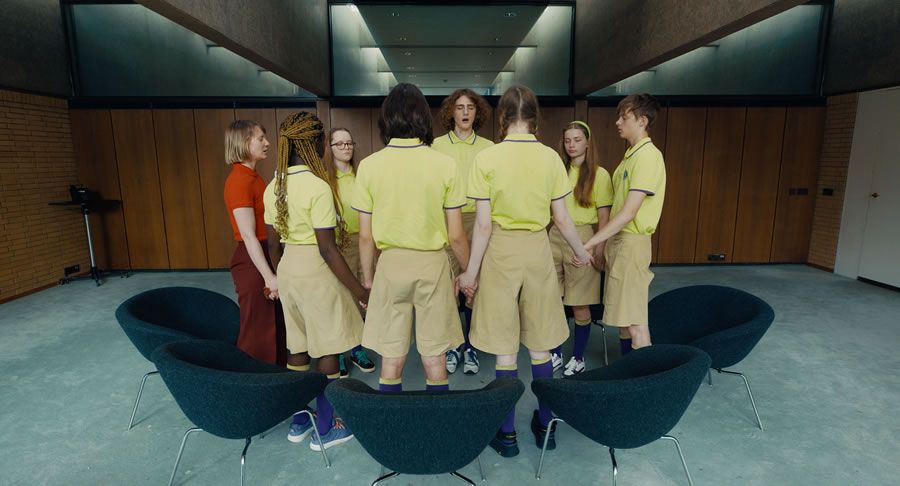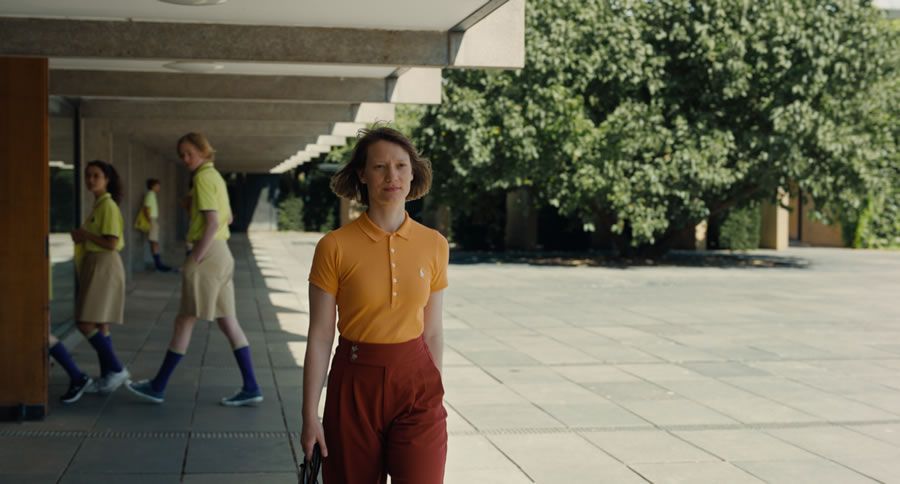05/26/2023
Club Zero: A Thrilling Reflection on Parental Responsibility and Adolescent Challenges
"I enjoy when a film leaves gaps and spaces for thoughts. It is one of the elements that make the watching experience pleasant and enjoyable."
Club Zero is a mysterious group led by Miss Novak, the new teacher at an elite private school who has proposed an innovative course on conscious nutrition that soon gathers fervent followers among the students.
This is the plot of the new film by Austrian director Jessica Hausner, "Club Zero," which is competing for the Palme d'Or at Cannes 2023. Miss Novak is portrayed by Mia Wasikowska.

There is a theme revolving around this thriller, which is the quality time parents dedicate to their children, using it as an excuse to completely hand over the responsibility of education to their teachers. This creates a reflection that stems from the question: "How can parents control their children when they simply don't have enough time for them?"
The film explores the fear every parent has of losing a child. "Club Zero examines how parents entrust the responsibilities of their children to a teacher who abuses this trust. Mrs. Novak manipulates the children and separates them from their parents. Once the parents decide to save their children, it is already too late," explains Hausner, who has returned to the official competition for the second time after "Little Joe" (2019).

For the festival, this film addresses important themes of adolescents in this era, such as mental health and its relationship with food, even though the story never specifies a specific time and place. The director explains that she did not want to individualize this issue or judge because it is a situation that can happen to anyone, anywhere in the world, as it is more of a systemic matter. "We live in a meritocracy that makes us work more and more. I have the impression that the failure of parents is systemic." Ultimately, it also speaks about the dangers of ideology in minds that are beginning to develop their path to adulthood. "She truly believes she is saving them, and together they take it too far. That's what makes it so convincing and dangerous: in her ideology, she meets the young people's desire to change the world and amplifies the dangerous inclination to develop eating disorders for some of them," says the director.
Jessica confesses that behind the bold and colorful costumes in the film, there is a humorous intention. The costume designer, Tanja Hausner, the director's sister, explains these stylistic decisions, stating, "We stuck to daring ideas, just like with the color palette. Without realism, but with stylization that brings something unexpected, always with a certain irony." In the case of Mia Wasikowska's significant role, androgyny was considered to give her a character and authority. "It's a kind of mixture of femininity and masculinity that gives us an androgynous quality. Her clothes represent a sort of armor she wears to be taken seriously. It's not so much about the internal conflicts she may have," comments Tanja.
At Cannes
Just as "The Triangle of Sadness" received initial opinions due to the discussed vomiting scene, this film also caused reactions at the festival screening due to a sequence in which a teenager has to eat in front of her parents what she has just regurgitated. The feature film has been received with some lukewarm responses due to the satirical tone it aimed for, which does not succeed in some cases.
"The script, written by Hausner and her regular co-writer, Geraldine Bajard, takes aim at the wellness industry, diets, and their sinister influencers, distracted and sometimes hypocritical parents who fail to see the signs of mental illness in their own children, inadequate supervision provided in private schools, and the highly controversial 'pro-ana' movement that promotes anorexia online. However, the satirical arrows don't quite hit their mark... The inexperience of the younger actors, many of whom are appearing on screen for the first time and have not been well-directed, is also problematic," wrote Global Village Space.
<< Go to Spanish version
